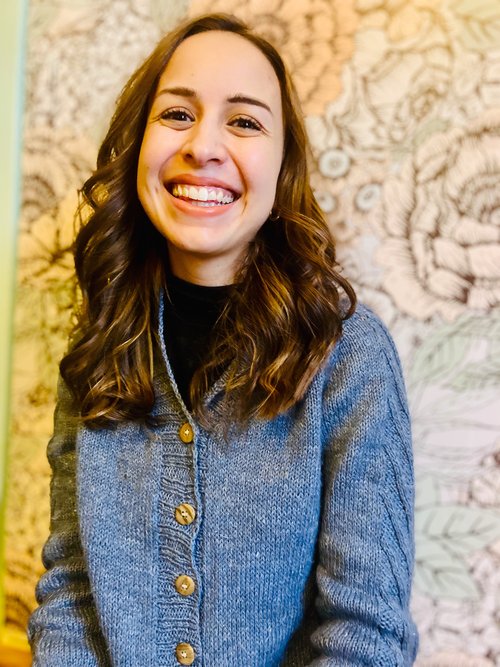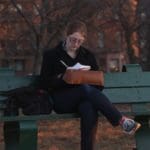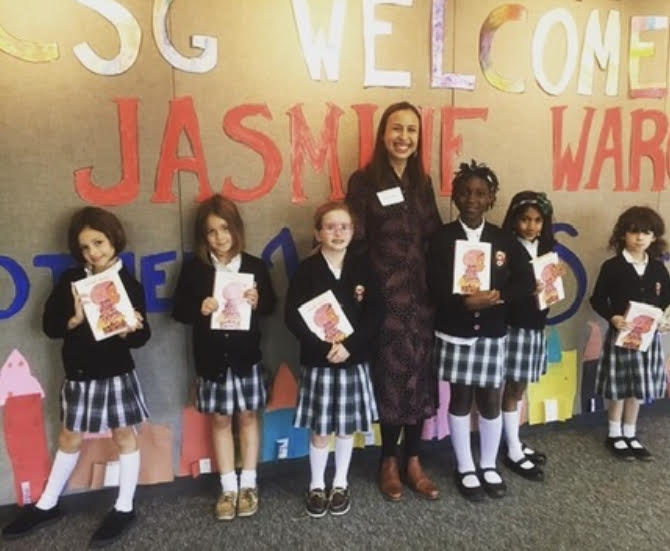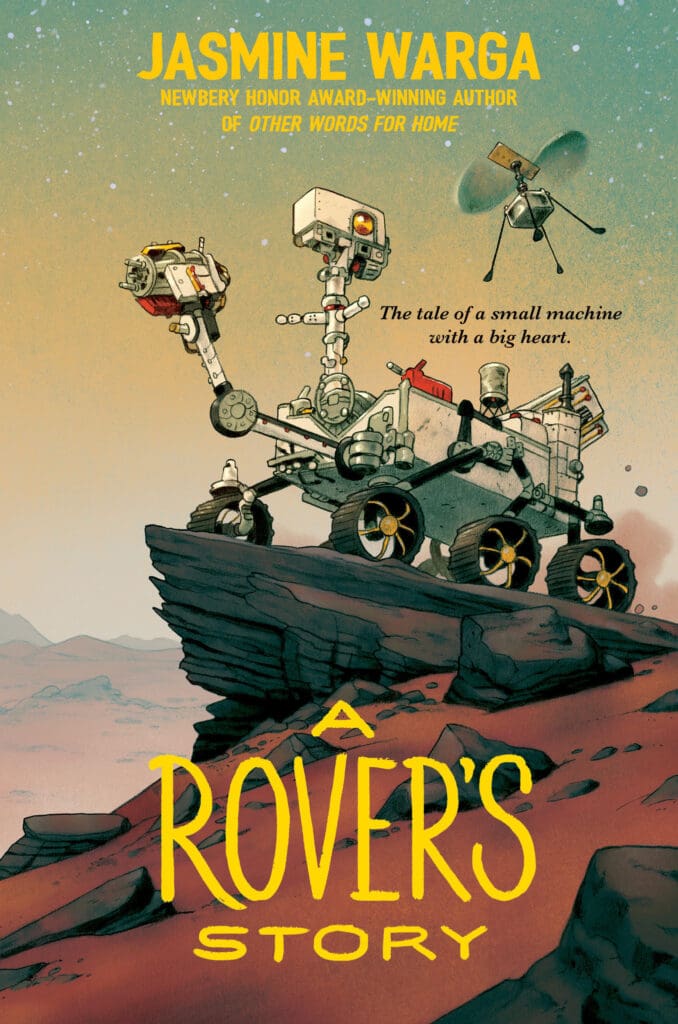Wrapping up our interviews for Women’s History Month is WFYP alum Jasmine Warga! Jasmine talks to us about winning the the 2020 John Newbery Honor for Other Words For Home, the inspiration behind her upcoming novel, A Rover’s Story, and how lucky she feels to be able to write for young readers.
JASMINE WARGA – WRITING FOR YOUNG PEOPLE, JUNE 2013

Jasmine Warga is the New York Times-bestselling author of middle grade novels Other Words For Home and The Shape of Thunder. Other Words For Home earned multiple awards, including a John Newbery Honor, a Walter Honor for Young Readers, and a Charlotte Huck Honor. The Shape of Thunder was a School Library Journal Best Book of 2021, and has been named to several state reading lists. She is also the author of young adult books, My Heart and Other Black Holes and Here We Are Now, which have been translated into over twenty different languages. Her next novel, A Rover’s Story, will be out on October 4, 2022. Jasmine currently teaches in the MFA program at Vermont College of Fine Arts. Originally from Cincinnati, she now lives in the Chicago-area with her family in a house filled with books.

Interviewed by
Julia Leef
Was there a moment when you knew you wanted to be, not just a writer, but specifically someone who writes for young people? Was there ever a time you dabbled in other genres?
Yes! This moment came for me, right after I graduated from college, when I took a job teaching 6th grade science. Over lunch break, I would often read to a handful of students who would hang out in my classroom. From sharing stories with them, I began to remember what an avid reader I had been when I was in middle school, and how books had been such a place of refuge for me (middle school was a really tough time in my life), and that’s when I had the epiphany that I wanted to write specifically for this age group. Before then, I’d always thought I would write serious adult short stories as I thought that was the pinnacle of capital L “Literariness”–but I never felt that spark when working on those short stories. I feel so lucky to get to write for young readers.
The Lesley MFA program has an incredible line-up of Writing for Young People writing faculty (as I’m sure you’ll agree!). Were there any individuals in particular you were looking forward to working with? What was some of the most valuable advice you received from one of your mentors?
I most certainly agree! I learned a lot from all the faculty members I was lucky enough to work with, but a couple of things stick out to me. First, from Pat Lowery Collins, I learned how to really tackle the nuts and bolts of crafting a scene, how to balance interiority with narrative action, and how to blend dialogue with external descriptions. I still struggle with this in my writing to some extent–especially the question of how to balance interiority–and I often find myself referring back to Pat’s wise guidance as she was the first writing teacher I had who really noticed this recurring problem in my work. I teach writing now, and I frequently pass along Pat’s wisdom to my own students. And also everything that I learned from Chris Lynch. I learned so much from Chris, but particularly the power in nailing down a narrative voice–and letting that voice be the vehicle from which you can steer the plot, how to get out of my own way, and how to do the work. Chris emphasized to me how more than anything writing is a discipline craft, and I think about that every day when I sit down to get to work.
Your book–Other Words For Home–is the winner of numerous honors, including the 2020 John Newbery Honor. How does it feel to have your work recognized in this way and do you feel that it puts pressure on you for future projects?
Well, of course, it’s a wonderful thing to have my work recognized in this way. It’s shocking, too. Some days (really most days!), I still can’t believe that Other Words For Home has earned the awards and gained the reception that it has. I feel tremendously lucky, and very grateful to everyone who has opened their heart to Jude’s story. As for pressure on my future projects–at first, I did feel a little paralyzed by it. Doubt began to trickle into my mind–could I ever write another book that people would like as much? What if my next book didn’t do as well? Was this a total fluke? Would everyone soon discover that I’m actually a terrible fraud?
But eventually, I was able to put away those doubts. I recognized what an extraordinary gift I’d been given. And I decided I wanted to use that gift to push myself to be bold, to take more risks, to write in ways that maybe I didn’t think I had the chance to before. I hope this leaning into risk-taking is evidenced in A Rover’s Story, my book that comes out this fall. It’s a novel unlike any other book I’ve ever written before. I’m very proud of it, but I’m also very grateful that I got the chance to write it–a chance that was given to me, in part, because of Other Words For Home‘s reception.

Let’s talk some more about A Rover’s Story. This book (which has such a fantastic cover, by the way) is a middle-grade novel about a fictional Mars rover, Resilience. Where did you pull inspiration from for this story? Were you excited to delve into science fiction and explore writing from a non-human perspective?
First, thank you for your kind words about the cover! I’m so grateful to illustrator Matt Rockefeller. The book will actually also feature full-spread illustrations by him as well, and I’m so excited about that. As for my inspiration, it came in July 2020 when my youngest daughter asked if we could watch the Mars Rover launch. At that point, I didn’t know much about the rovers or have much interest, but I said yes. We watched together and as the rocket that was carrying the rover lifted into the air my daughter turned to me and said, “Do you think the robot is scared?” And that question inspired the whole book. This question of what does it mean to be scared–what does it mean to feel–what does it mean to be human. I started researching the rovers, and as I learned more, I knew I had found my next story.
I loved working on the book and getting to stretch my creative muscle in this different way. But funny enough, as different as it is from my other books in tone and genre, it is similar too as it also grapples with big questions about home and belonging.
Is there anything on your ‘writer bucket list’ that you have yet to check off? A subject or genre you’d like to write in, a collaboration or a different sort of project you’d like to try?
You know, I’ve always wanted to write a fantasy—a fairytale-inspired type novel. I’d also love to do an early reader series someday.
Sounds fun! With The Shape of Thunder out last May and A Rover’s Story coming in October, do you have a little space between projects or are you already working on the next one?
Good question. So my brain is always working on multiple things at once. When I’m revising one project, I’m usually daydreaming/brainstorming about another one. I sometimes describe my brain as being like a stovetop with multiple pots on it–but all the pots are at different stages–some of them simmering, some of them boiling. Let’s think of the boiling ones as the project I’m actively drafting or revising, and the simmering one as the project I’m brainstorming. That’s a long way of saying–yes, I’m working on something new. I’m drafting it. But I’m also brainstorming/daydreaming about lots of other things.
Listen to Jasmine read from her upcoming book, A Rover’s Story:




Comments are closed